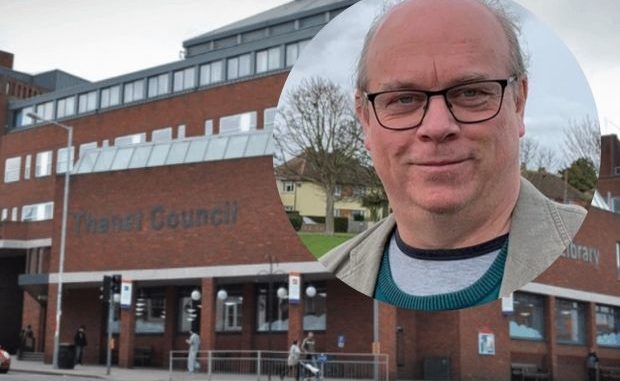
Thanet District Council’s new leader Cllr Rick Everitt says bringing council housing back under direct authority control and making the district carbon neutral by 2030 are among the top priorities of the new Labour led minority administration.
Cllr Everitt took the top role following a vote of no confidence in former leader Bob Bayford (Conservative) last night.
This vote followed a series of protests about the losses at Ramsgate Port, the buying of two huge pontoons destined for the Brett Aggregates berth 4/5 and the Royal Harbour using ‘permitted development rights’ instead of planning permission, the suspension – and reinstatement – of the Section 151 officer and grievance complaints regarding bullying within the council.
The motion was put by Thanet Independent Group leader Stuart Piper asking for the vote of no confidence and, an added amendment, for the removal of Cllr Bayford from office.
A vote saw 29 in favour of removing Bob Bayford from leadership, 22 against and one abstention.
Nominations were then immediately made for a new leader. Cllr Bayford was again put forward, Labour leader Rick Everitt was nominated and a nomination was made for Conservative Ash Ashby – who refused the option of being voted in to the role.
The new vote, which had two abstentions, was won by Labour’s Rick Everitt meaning not only was Bob Bayford ousted but the Conservatives lost control of the council.
Cllr Everitt says Labour will work collaboratively with members across the council, a necessity as Labour has just 20 of the council’s 56 seats.
Cllr Everitt said: “Last night’s meeting did not just choose a new leader from the Labour party, it also voted to pursue our priorities of bringing Thanet’s council housing back under direct control, building more of it, making the council carbon neutral by 2030, and supporting the area’s economy by using the council’s budget to buy from local enterprises where possible.
“The council chose a new leader and I am grateful for the support of my colleagues, but success will not be achieved by one individual. It will be only delivered by the efforts of talented and passionate group of people alongside me in the Labour team, and the hard work of council staff at all levels.
“Thanet still faces formidable problems caused by the Tory government’s austerity regime, long-term economic decline and a past failure to focus on the issues that matter to residents. There are also looming risks from a no-deal Brexit. The context doesn’t change because councillors move from one side of the chamber to the other.
“We will bring a fresh approach, but we secured the leadership with the support of eight councillors from outside the Labour Party and we recognise that to retain it and provide the stability Thanet needs we will need to work collaboratively across the council chamber.
“Resources are a major issue but I can promise that we will strain every sinew to do our best for all the people of Thanet and everyone who works for the council.”
Cllr Helen Whitehead was named as the council’s new deputy leader and the other members of Labour’s shadow cabinet are also expected to step up.
Cllr Everitt was cabinet member for finance and asset management during the previous minority Labour administration in Thanet from 2011-15. He was a member of the ruling group on Bexley Council from 2002-06 and Labour’s parliamentary candidate for Old Bexley and Sidcup in 2010.

